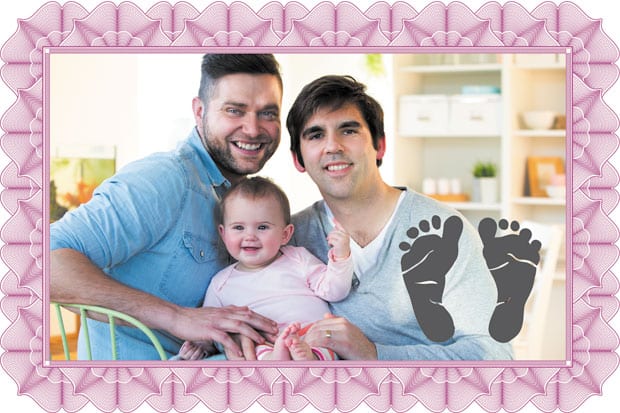As ordered, Texas rolled out new rules that allow both parents’ names on vital documents

DAVID TAFFET | Senior Staff Writer
Texas has rewritten its rules on birth certificates, but attorneys still encourage same-sex couples to do an adoption.
The new rules issued by Texas Vital Statistics Unit give parents a choice how a birth certificate will read. Parents’ names may be labeled mother, father or parent.
When a married woman gives birth, her spouse is the presumed second parent. Now it doesn’t matter if that spouse is a man or a woman. A same-sex married couple may now adopt together. When the adoption is complete, both parents’ names may be placed on the child’s birth certificate.
If a surrogate is used, both parents’ names will go on the birth certificate. Previously, only a biological parent’s name would appear on the document when the parents were a same-sex couple.
The second parent in a same-sex relationship would have to adopt. Now the second parent’s name will be entered on the document at birth if the parents are married.
In the past, when same-sex couples adopted, only one parent was allowed to adopt and that parent’s name went on the birth certificate. A second parent adoption could begin three months later, but that parent’s name wouldn’t appear on the birth certificate.
Now, married parents may adopt together and couples that were married at the time of the adoption may file a request with Vital Statistics to have the second name added to the birth certificate.
Austin attorney Suzanne Bryant specializes in adoptions by same-sex couples. She said having both names on the birth certificate simplifies a number of things, like applying for a passport, travel, enrolling a child in school, taking the child to the doctor or applying for college and scholarships.

Attorney Suzanne Bryant, above, encourages couples to continue adopting, even if both names appear on the birth certificate. James Stone-Hopkins, below right, filed a motion to be listed on his husband James’ death certificate. That prompted Judge Orlando Garcia to order all vital statistics follow the Obergefell decision.
But Bryant said many same-sex couples are now saying, “Why should I bother to do an adoption?”
She said when a relationship is going well, the birth certificate will suffice. But half of all straight marriages end in divorce. As more same-sex couples marry, the number of same-sex divorces will rise as well.
If a couple who had a child splits up, a judge may decide to give custody of the child to the birth mother, even if both names appear on the birth certificate. Bryant said the second parent has the standing of a judge’s orders if an adoption is completed.
If a birth mother dies, her parents may decide to sue for custody without a court order declaring the second mom a legal parent. The birth certificate may be evidence, but won’t be seen as a court ruling by a judge deciding custody.
“A birth certificate can be challenged,” Bryant said. “It’s too bad we still have to do an adoption, but you need a court order.”
Bryant said in some states, judges regularly issue a parentage order without subjecting the couple to an expensive and time-consuming home study. “I wish that would become more common in Texas,” she added.
The new rules the Vital Statistics Unit drew up came into place after a Conroe man filed a motion in the Texas marriage equality case in order to be recognized on his husband’s death certificate in August. U.S. District Judge Orlando Garcia ordered marriages that predated the U.S. Supreme Court’s marriage equality ruling be recognized for purposes of all state documents. He told the state’s Department of State Health Services to rewrite rules that apply equally to all married couples.
For couples with children, that allowed both parents to go on a Texas birth certificate for the first time.
While the new rules have been in place since September, states such as Florida are just beginning to grapple with the issue. A suit was filed this week in Florida after that state continued to refuse to recognize married couples for purposes of a birth certificate.
How to apply
One of two forms would be used to apply for a new birth certificate, according to Christine Mann, press officer for the Texas Department of State Health Services.
“VS-160 is an adoption form,” Mann said.
If either one or both of the parents are not the biological parents, use this form to amend the birth certificate to include the second adoptive parent. To use this form there must be an official adoption decree from the court.
“VS-166 is an application for a new birth certificate based on presumption of parentage or a gestational court order,” Mann said. “For example if there is already one parent on the birth certificate, the spouse can be added to the birth certificate.”
 Instructions are attached to the forms.
Instructions are attached to the forms.Certified copies of a marriage license, informal marriage declaration (common law) or court order including adoption order must be included. This will not be returned unless requested.
Send a check for $47 — issuing a new birth certificate is $25 and sending a certified copy is $22.
Send to: Vital Statistics Unit, Department of State Health Services, P.O. Box 12040, Austin, Texas 78711.
Additional information can be found on the DSHS https://www.dshs.state.tx.us/vs/reqproc/forms.shtm. Follow the link that says the department “is implementing revised policies and will also amend certain vital events forms and records in response to the June 26, 2015 Supreme Court ruling in Obergefell and the July 7, 2015, U.S. District Court ruling in DeLeon.”
Copies of the forms may be downloaded from the DSHS website and are attached to the online version of this story and can be downloaded from DallasVoice.com.
This article appeared in the Dallas Voice print edition October 23, 2015.


do you know how long does VS-160 take??